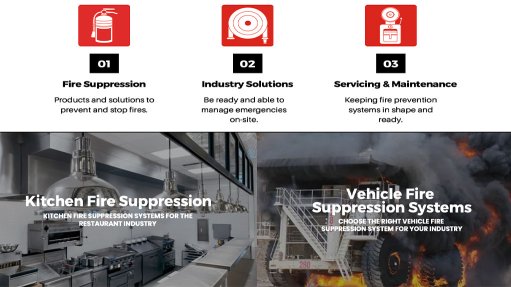The convergence of intelligence – DCS, SCADA and TLC
This article has been supplied.
By: Kobus Vermeulen - Direct Sales Executive, Process Automation at Schneider Electric
In the early days of industrialisation, control systems were primarily mechanical and relied on manual intervention and simple feedback loops to manage processes. And whilst it sounds positively medieval compared to today’s technologies, these systems played a very important role in man and machine’s industrial evolution.
Fast forward to the middle of the 20th century and electronics and computing technologies had advanced to a point where industries could leverage automated systems that require minimal human intervention.
These early digital control systems were centralised, with a single controller managing multiple processes. However, they had limitations like single points of failure and scalability challenges.
Now in the 21st century, industrial process automation systems are mind-blowingly intelligent and provide almost unparalleled control and monitoring capabilities, making it integral to modern industrial systems.
Intelligence like no other
At the forefront of these intelligent systems are Distributed Control Systems (DCS), Supervisory Control and Data Acquisition (SCADA), and Total Load Control (TLC) systems which have significantly transformed the industrial automation landscape.
Each system plays a distinct yet complementary role, enhancing the efficiency and sustainability of industrial processes. DCS centrally manages complex processes while SCADA focuses on remote monitoring and control, and TLC optimises energy management by regulating electrical loads. Quite the industrial trifecta.
It is also the convergence of these three systems into unified solutions that is driving the proverbial next wave of industrial automation, marked by enhanced efficiency, resiliency and intelligence.
Trifecta of intelligence
As mentioned, the integration of DCS, SCADA and TLC into unified systems leads to fundamental benefits such as:
- Streamlining operations - unified systems consolidate various control functions, reducing complexity and improving overall efficiency. By integrating different automation and control layers into a cohesive platform, businesses can eliminate redundancy, simplify maintenance, and enhance system interoperability.
- Comprehensive data utilisation which leverages data synergies across different streams, enabling more comprehensive monitoring, control, and analysis. This complete view provides operators with actionable insights, supporting predictive analytics and better operational decision-making.
- Cost-effectiveness and resource optimisation: Integration minimises redundancy, optimises resource allocation, and enhances energy efficiency, leading to more sustainable and productive outcomes. Standardised interfaces and protocols reduce the costs associated with system integration, expansion, and maintenance.
From the above it’s clear that the integration of DCS, SCADA, and TLC systems empowers companies to make data-driven decisions whilst optimising operations. Plus, if one adds AI analytics and IoT into the mix these systems become even more optimised:
- AI enables real-time data processing and pattern recognition, allowing quick responses to changes and anomalies.
- AI predicts equipment failures by analysing sensor data, reducing downtime through proactive maintenance.
- AI and IoT drive systems towards autonomous control, enhancing efficiency and reducing human intervention.
- AI dynamically adjusts parameters for optimal performance and energy efficiency.
- AI and IoT process data at the network edge, minimizing latency for faster responses.
Ultimately, the industrial automation marketplace is set to become even more intelligent, providing fundamental benefits to organisations and industry alike. In fact, at the current growth rate, in the next few years, today’s systems might even sound slightly outdated.
Article Enquiry
Email Article
Save Article
Feedback
To advertise email advertising@creamermedia.co.za or click here
Announcements
What's On
Subscribe to improve your user experience...
Option 1 (equivalent of R125 a month):
Receive a weekly copy of Creamer Media's Engineering News & Mining Weekly magazine
(print copy for those in South Africa and e-magazine for those outside of South Africa)
Receive daily email newsletters
Access to full search results
Access archive of magazine back copies
Access to Projects in Progress
Access to ONE Research Report of your choice in PDF format
Option 2 (equivalent of R375 a month):
All benefits from Option 1
PLUS
Access to Creamer Media's Research Channel Africa for ALL Research Reports, in PDF format, on various industrial and mining sectors
including Electricity; Water; Energy Transition; Hydrogen; Roads, Rail and Ports; Coal; Gold; Platinum; Battery Metals; etc.
Already a subscriber?
Forgotten your password?
Receive weekly copy of Creamer Media's Engineering News & Mining Weekly magazine (print copy for those in South Africa and e-magazine for those outside of South Africa)
➕
Recieve daily email newsletters
➕
Access to full search results
➕
Access archive of magazine back copies
➕
Access to Projects in Progress
➕
Access to ONE Research Report of your choice in PDF format
RESEARCH CHANNEL AFRICA
R4500 (equivalent of R375 a month)
SUBSCRIBEAll benefits from Option 1
➕
Access to Creamer Media's Research Channel Africa for ALL Research Reports on various industrial and mining sectors, in PDF format, including on:
Electricity
➕
Water
➕
Energy Transition
➕
Hydrogen
➕
Roads, Rail and Ports
➕
Coal
➕
Gold
➕
Platinum
➕
Battery Metals
➕
etc.
Receive all benefits from Option 1 or Option 2 delivered to numerous people at your company
➕
Multiple User names and Passwords for simultaneous log-ins
➕
Intranet integration access to all in your organisation





















